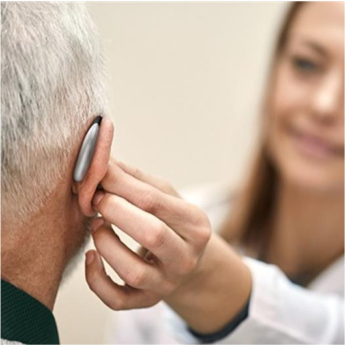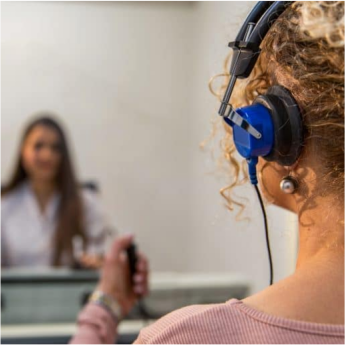Hearing Tests
Hearing Tests: A Step Toward Better Hearing
Hearing Healthcare You Can Trust

Do You Need a Hearing Test?
Protect Your Hearing, Preserve Your Quality of Life
Regular hearing tests are crucial for detecting any changes in your hearing early on. Many people experience gradual hearing loss, which can go unnoticed until it affects everyday life. Catching these changes early allows us to take steps to prevent further damage and improve your hearing health.
Here are some signs you may need a hearing test:
- Difficulty hearing conversations, especially in noisy environments.
- Frequently asking others to repeat themselves.
- Turning up the volume on your TV or phone more than usual.
- Ringing in your ears (tinnitus) or a feeling of pressure in your ears.
If you’ve noticed any of these signs, it’s important to schedule a hearing test to ensure your hearing health remains in check.
Improved Communication and Social Engagement


How to Prepare for a Hearing Test
Simple Steps to Make the Most of Your Appointment
Preparing for a hearing test is simple. To ensure accurate results, here are a few tips:
- Avoid loud noises: Try to avoid loud environments for at least 24 hours before your test, as exposure to loud sounds can temporarily affect your hearing.
- Bring a list of medications: Certain medications can impact your hearing, so it’s helpful to bring a list of anything you’re currently taking.
- Write down any symptoms: If you’ve been experiencing hearing issues, jot down your symptoms and any specific concerns you’d like to discuss during your appointment.
The Hearing Test Process
What to Expect During Your Visit
Your hearing test at Whittaker Hearing Center is designed to be thorough yet comfortable, giving us a clear picture of your hearing health. Dr. Angela Whittaker will walk you through each step to ensure you feel informed and at ease. Here’s what you can expect during your hearing test:
- Discuss Hearing History: Dr. Whittaker will ask about your hearing symptoms and medical history.
- Pure-Tone Testing: You'll listen to sounds at different pitches and volumes and indicate when you hear them.
- Speech Testing: We'll assess how well you understand speech, especially in noisy environments.
- Middle Ear Tests: These tests check for issues like fluid or wax buildup in the middle ear.
- Review Results: Dr. Whittaker will explain your test results and recommend next steps for your hearing care.


Next Steps After Your Hearing Test
Understanding Your Hearing Loss and Planning for the Future
If your test results show signs of hearing loss, don’t worry—there are many effective ways to improve your hearing. We’re here to support you every step of the way! You will get the care and tools you need for better hearing.We’ll work closely with you to find the best solution that fits your specific needs and lifestyle. Here are some common recommendations:
- Hearing Aids: Today’s hearing aids are small, comfortable, and come with advanced features that can greatly enhance your ability to hear.
- Protective Devices: If your hearing loss is due to loud noise exposure, we may suggest custom ear protection to help prevent further damage.
- Hearing Rehabilitation: We offer services to help you adjust to your new hearing aids or manage conditions like tinnitus for a smoother transition.
Ongoing Support for Your Hearing Health Journey
Your hearing health is a lifelong journey, and we’re here to provide the ongoing care you need. After your initial visit, we recommend regular check-ups to monitor your hearing and ensure that your hearing aids or other devices continue to work well for you.
